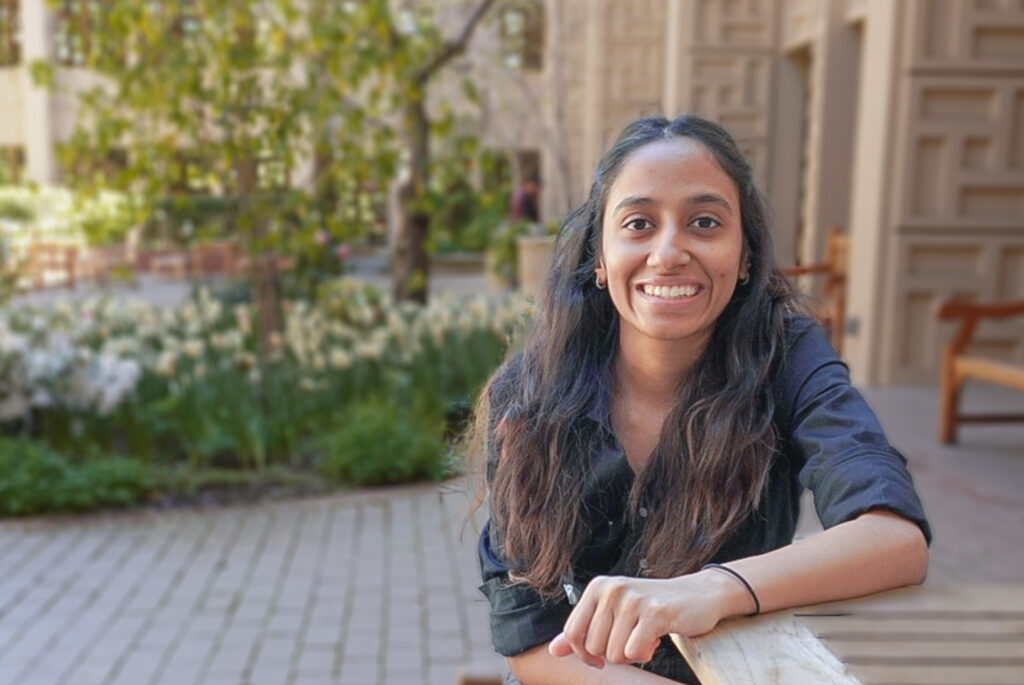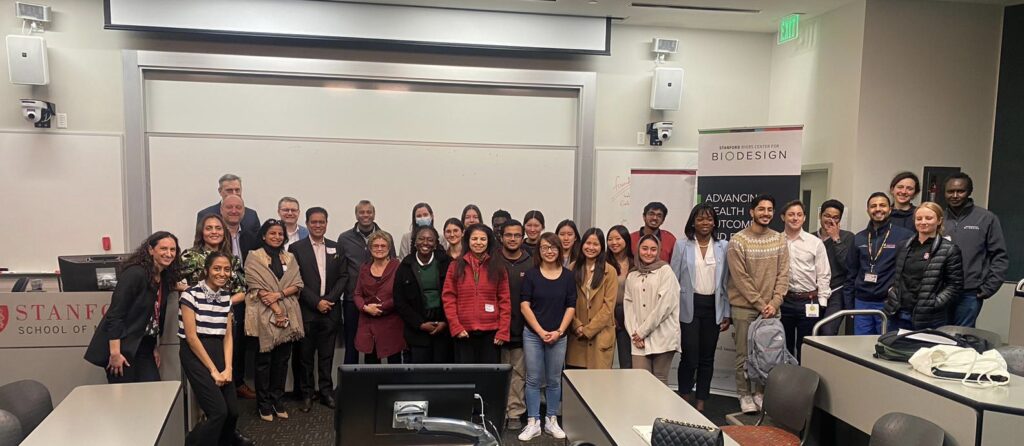Published: 04/11/2023
As part of an ongoing series where we get to know the students engaged in global health at Stanford, we speak with Sruti Paturi, a master’s student in Management Science and Engineering who has served as a teaching assistant for two global health courses. In the following interview, Paturi discusses her passion for combining healthcare, technology, and policy to address global health challenges, and how her time at Stanford has helped her prepare for the next steps in her career.

Interview by Jamie Hansen, Communications Manager
Tell us a little bit about yourself and your involvement in global health.
I grew up in Hyderabad, India. I earned my undergraduate degree in biotechnology there and then worked for a couple of years in global business development at a bio-pharmaceutical ecommerce startup. Through this experience, I learned that I wanted to do work with a clear impact on peoples’ lives, and on a large scale.
I applied for and was accepted to Stanford’s Management Science and Engineering program. Because of the pandemic, I opted to defer my start date and spent one year at a policy think tank where I helped develop a health system reform proposal for India. The proposal has since been published and shared with Indian policymakers. I’m now in my second year at Stanford, focusing on Health Systems Modelling and Technology Management. I’ve also gotten involved in various global health classes and projects. These experiences further defined my skills and motivations.
Looking ahead, I hope to spend my career working at the intersection of healthcare, technology, and policy to solve problems related to access to care in underserved settings. I’ve accepted a position at Abbott, where my role will focus on increasing access to infectious disease diagnostics in emerging markets. I’m excited to begin this work following graduation in June.
How did you get interested in global health?
I’ve always wanted to make a positive impact on the world. During my undergraduate years, I became aware of the inequity in healthcare access. In class, as I learned about the potential of technology in saving and improving lives, I began to realize its limitations while volunteering at a government school and a local hospice for the underprivileged. There, I saw the contrast in the experiences of these less privileged children and terminally ill patients compared to my own family’s. For instance, the kids that I taught never had health checkups, whereas my school had annual free dental and eye exams for all students.
I remember feeling outraged by an article in The Lancet during that time, that said 8 million preventable deaths occur in low-income countries from lack of access to high-quality care. It started becoming clear to me that while technology can solve problems in theory, getting these technologies to the people who need them is perhaps a bigger challenge.
I’ve always wanted to make a positive impact on the world. During my undergraduate years, I became aware of the inequity in healthcare access.
Sruti Paturi
Tell us more about your global health experiences at Stanford.
My global health experiences at Stanford began with the Social Entrepreneurship and Innovation Lab (MED 224) in Fall 2022, where I joined Kayla Huemer (’22) in developing an academic research project on PETRA, a low-cost technology for predicting diabetic foot ulcers in India.
This experience led me to MED 232, Scaling Technology Innovations in Low Resources Settings with Drs. Michele Barry and Anurag Mairal, which shaped my outlook on global health technology innovation and the role I want to play. I got involved in a project with Abbott on primary care capacity-building in Rwanda, and over the summer, I had the opportunity to travel there for a field visit. It was one of the most fulfilling and enlightening experiences I’ve had, illuminating the difference we can make through our commitment and partnerships. The passion I saw in the people on the ground was deeply motivating.
Dr. Steve Luby’s class on Theories of Change in Global Health, INTLPOL 291, helped me internalize the complexity of global health problems and the fact that there is no silver bullet. It honed my systems-thinking skills and provided a framework to think through the journey of global health problems in time and the necessary conditions for different kinds of solutions to work.
What has been one of your most meaningful or educational experiences as a Teaching Assistant?
My TA experiences with first Med 233, then MED 232 last quarter, and now MED 194/294, Global Health Through an Equity Lens, have helped me further engage with global health at Stanford and learn from current and future leaders in the field.
I’ve gained a lot from interacting with the teaching team, the guest speakers, and the students. The most meaningful experience has been learning from all the students and watching their projects and perspectives develop throughout the quarter. I find it remarkable what we can achieve in a short ten weeks at Stanford, and I am amazed by the depth and diversity of perspectives.

How would you encourage other students to get involved with global health education or activities at Stanford?
There’s something for everybody interested in any aspect of global health work at Stanford. All the classes I’ve mentioned — MED 232, MED 194/294, and INTLPOL 291 — are exceptional. The Global Health Student Council is a great platform to get involved in student-led activities. Funding for early-stage research is available through CIGH Global Health Seed Grants and VPDoR’s International Research Exploration Seed Grants, while the Global Health Research Convening allows students to present their work to the Global Health community. For students interested in the business side of health, Stanford SEED at the Graduate School of Business offers a wide variety of internships in emerging markets, many of them health-related.
I truly appreciate the inclusivity and diversity in the global health community at Stanford.
Stanford’s is a highly motivating environment that encourages you to pursue your own journey in the global health space, while providing the opportunities and network to engage in work in every part of the world – including underserved communities within the US.
Sruti Paturi
Stanford’s is a highly motivating environment that encourages you to pursue your own journey in the global health space, while providing the opportunities and network to engage in work in every part of the world – including underserved communities within the US. There is a sense that we are all part of something bigger, and that each of us brings something unique and important to the table.